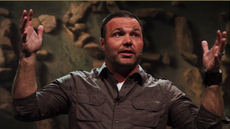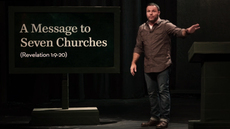Easter is over.
Hopefully, you took our challenge to heart during this Easter season, and by the grace of God and the power of the Spirit, you stepped outside of your comfort zone and invited some friends to an Easter service. If so, I’ve no doubt that—possibly to your surprise—some of them came.
Now what? What are you supposed to do?
Simple: Follow up!
The worst thing you could do is treat someone you invited to an Easter service like a bad date you don’t call back. It’s eternally important that you follow up with whomever you invited with the hope to connect them with Jesus.
The following are some very practical things you should know and do.
They Have a Level of Interest
The first thing you need to understand when following up with family members and friends is that if they came to Easter service with you, they have a level of interest in Jesus.
They stepped outside of their comfort zone onto your turf. I think this speaks volumes about their interest.
Be encouraged that people you invited were willing to step across the “stained glass barrier” and hear about Jesus. The Holy Spirit just may be at work within their lives, drawing them to Jesus.
Pray for Them
Ultimately, it’s not us who bring people to Jesus, but the Holy Spirit drawing them to him. As such, we can rest in the sovereignty of God and know that if we’re faithful to preach and model Jesus that he is ultimately in control.
It’s in our nature to want to take control and wrestle a bull by the horns. If we’re not careful, we start to think that it’s our work that saves people, when in fact it’s Jesus’ work on the cross that does.
Make sure to continually be in prayer for your friends and family to meet Jesus and that the seeds planted on Easter will grow and produce fruit in their life.
Talk to Them
Out of prayer and dependence on the Holy Spirit, have a simple conversation with your non-Christian friends and family to follow up. Thank them for coming, ask them about their experience, what they thought about it, and if they have any questions. When you discover what led them to participate in worship, you’ll be better able to connect those interests in pointing them to Jesus.
For instance, if you discover that they went to an Easter service because “it’s the right thing to do,” then you could find a way of talking about salvation by faith, not works.
Also, during this time you’ll be able to uncover their roadblocks to faith in Jesus. Obviously sin keeps people from seeing Jesus for who he truly is (1 Cor. 1:18, 22–24; 2:14), but there are legitimate questions and issues that people have with Jesus and the church. From negative experiences with the church, to misinformation about God and the Bible, to even different religious or secular beliefs, there are many questions that can be answered and issues resolved.
Honor Jesus, ask questions, and be prepared to defend why you believe in Jesus (1 Pet. 3:15). And don’t worry if you know the answers to their questions. If you don’t know them, just let them know you’ll get back with them soon.
The following are some good books to read in preparation.
-
The Reason for God, by Timothy Keller
-
Jesus Among Other Gods, by Ravi Zacharias
-
Ethics for a Brave New World, by Paul D. Feinberg and John S. Feinberg
Invite Them Back and Get Them Plugged In
After talking with them about their experience, you can always invite them again to worship or your Community Group. If you’re not in a Community Group, this would be a great time to get involved in one.
One of the biggest ways people grow in Christ and become part of the community of Christ known as the church is through Community Groups. Often, people become part a community long before they adopt the beliefs and practices of a community. This is because one of the best ways for people to experience life transformation through Jesus is by seeing the lives of people transformed by Jesus.
As I wrote in The Radical Reformission :
Reformission evangelism understands that the transformed lives of people in the church are both the greatest argument for, and the greatest explanation of, the gospel. Therefore, it welcomes non-Christians into the church, not so much through evangelistic programs as through informal relationships like Jesus developed with his first disciples . . . reformission evangelism considers it vital that lost people be brought close enough to witness the natural and practical out-workings of the gospel in people’s lives. Reformission Christians are not ashamed of the gospel, and they speak about Jesus and pray to him in front of their lost friends as they would around their Christian friends; and their lost friends appreciate their authenticity. Their lost friends are comfortable asking them questions about the Christian life, and these Reformission Christians have earned the right to give answers as a result of their friendship and hospitality.
Jesus is alive and changing lives today. My prayer is that we’ll see a great harvest from those who came and heard about him this Easter. I invite you to be in prayer with me.















